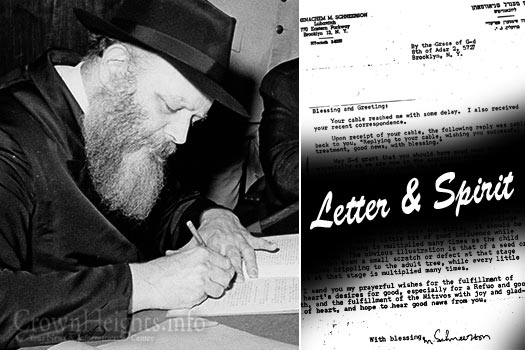
Letter & Spirit: Should an Eruv Be Erected?
In this week’s edition of Letter and Spirit, we present a letter from the Rebbe written on Chol Hamoed Pesach in 1964 to the rabbi of a Jewish community in New York City, in which the Rebbe discusses whether or not an Eruv should be erected. The letter was written in English through the Rebbe’s trusted secretary Rabbi Nissan Mindel, and was made available by the latter’s son-in-law, Rabbi Sholom Ber Shapiro.
This weekly feature is made possible by a collaboration between CrownHeights.info and Nissan Mindel Publications. Once a week we publish a unique letter of the Rebbe that was written originally in the English language, as dictated by the Rebbe to Rabbi Mindel.
***
By the Grace of G-d
Chol Hamoed Pesach, 5724
Brooklyn, N.Y.
Rabbi
New York, N.Y.
As you will surely recall, the matter was raised a few years ago, when I expressed my position, which has not changed. However, since I do not know if you are fully informed of it, I will reiterate the main points of my viewpoint relative to this matter.
Firstly, as a matter of principle, my opinion is that where according the din an eiruv can be instituted, it should be instituted. This is based on the opinion of many poskim, including that of Admor HaZaken in his Shulchan Aruch.
Secondly, special consideration has to be given to the state of affairs and attitudes in respect of the observance of the mitzvos in the present day and age, which has a particular bearing on the problem under discussion. I have in mind the precaution which such an eiruv calls for under the best of circumstances , and certainly here and now, against the possibility of the eiruv becoming possul in the olden days, when there was a close contact between the Jewish community (“the man in the street”) and the Beth Din or Rav, the invalidation of the eiruv and the consequent resumption of the pre-eiruv state of the prohibition of carrying on Shabbos, could be fairly easily communicated to the “man in the street” and no harm was done. Nowadays, unfortunately the position is different. While the institution of the eiruv would quickly become common knowledge, not only through various media of communication, but also by word of mouth, the suspension and temporary rescinding of it in case of its invalidation, would only reach those who are in contact with the Rabbinical authorities, or who attend the synagogue regularly, whereas many would remain in ignorance of the changed situation. Moreover, many of those who might get into the habit of carrying on Shabbos on the strength of the eiruv, might not so readily discontinue to do so even if they became aware of the breakdown in the eiruv; and this contingency is particularly to be considered in relation to the Jewish youth in this country.
In view of the above, it is an absolute necessity, in my opinion, that the eiruv, if one is feasible at all according to din, should be carried out in the utmost secrecy. This means that the purpose of the eiruv would be not to enable a Jew to carry his tallis to shul on Shabbos, but only to relieve those who already transgress the Shabbos by carrying things, from doing so b’issur.
Thirdly and this too is an essential point in my position. The opinion expressed in the first conditional paragraph, namely, that where an eiruv is permissible according to the din it should be instituted, is based of course on the general principle indicated above. However, it expresses no opinion regarding any particular place, such as Manhattan in this case, as to whether or not it indeed qualifies for an eiruv according to the din. This is a matter to be decided by the Rabbinical authorities who have thoroughly investigated the pertinent details in full accord with the Hilchot Eiruvin.
Fourthly, assuming that it be agreed that the eiruv should be instituted without publicity, as above, the question may be asked whether it would be warranted to follow the more lenient view of some poskim regarding the qualifications of the place, in order to remove the transgression of those who carry in any case (inasmuch as the eiruv would not be intended to induce the Shabbos observer to carry on Shabbos). However, this would not be right, in my opinion, for two important reasons: a) a Rov, or Rabbinical authority, should always act only in strict adherence to the Shulchan Aruchin in every detail, and b) it is inevitable that the existence of an eiruv should not become known to limited circles, with the result that some individuals would be tempted to accept it on its face value, especially in this country where there is a strong tendency to find hetterim and make religious observance more “convenient.” Hence, it is my considered opinion that not only should the eiruv be done in the utmost secrecy, but that it should be done only if the place strictly qualifies for it in accordance with the din.
I take this opportunity to extend to you and yours my prayerful wishes for a continued kosher and happy Pesach.
With blessing,
(by reason of Chol HaMoed, this letter is left unsigned)
***
The above letter is from newly-published The Letter and the Spirit Volume III by Nissan Mindel Publications. The letters are from the archives of Rabbi Dr. Nissan Mindel, a personal secretary to the Previous Rebbe and The Rebbe, whose responsibilities included the Rebbe’s correspondence in English.
We thank Rabbi Sholom Ber Shapiro, director of Nissan Mindel Publications and the one entrusted by Rabbi Mindel, his father-in-law, with his archives, for making these letters available to the wider public. May the merit of the many stand him in good stead.













